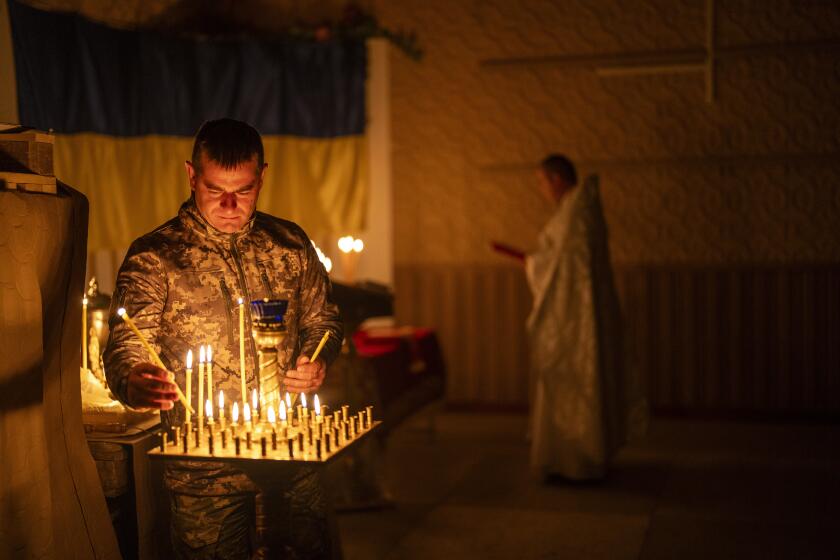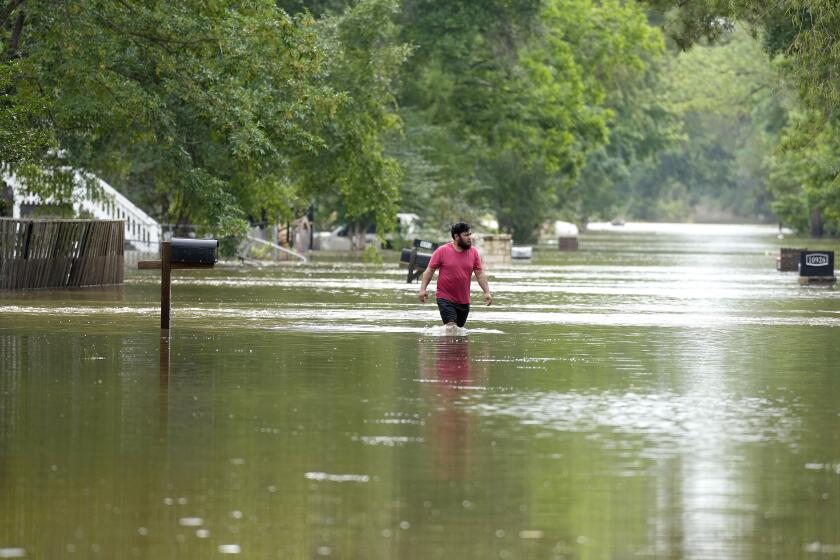Libyan Pilgrims Arrive in Israel; Kadafi Reportedly Wants to Visit : Mideast: The trip marks a major policy shift by Tripoli regime. Israelis are cautious and U.S. is reportedly suspicious.
Nearly 200 Muslim pilgrims from Libya, one of Israel’s most implacable foes in the Arab world, arrived in Jerusalem on Monday to pray at the city’s Islamic shrines, and their sponsor announced that Libyan leader Moammar Kadafi also wants to visit this year.
Yaacov Nimrodi, an Israeli businessman and arms dealer who organized the trip, described it as “a pilgrimage of peace” and a breakthrough in Israel’s long search for peace with its Arab neighbors.
Hoping to win Western acceptance after years as an international pariah, Kadafi is preparing to recognize Israel, Nimrodi continued, and is planning his own pilgrimage to the Islamic holy places here.
“The man plans and wants to come to visit Israel after the pilgrims return home happy and with their hearts full after fulfilling their obligation to God by praying at Al Aqsa Mosque,” Nimrodi said.
“His chief of staff told me Kadafi intends to come and recognize the state of Israel; I believe Kadafi will be in this country this year, God willing.”
The pilgrimage itself is a dramatic shift in Libyan policy; Kadafi has not only opposed the 19-month-old Arab-Israeli peace talks but over the years has harbored, trained and financed the most radical Palestinian groups and, according to the United States, backed numerous terrorist attacks worldwide.
“Kadafi is a politician, a clear statesman, and he has noticed the changes in the world and is trying to adapt himself to the shift in winds,” Nimrodi said as he greeted the Libyans as they crossed from Egypt into the occupied Gaza Strip en route to Jerusalem.
But Daoud Salem Tajouri, the leader of the 192 pilgrims, said they had come only to pray at Jerusalem’s Al Aqsa Mosque and the adjacent Dome of the Rock, two of Islam’s holiest sites, on the Eid al-Adha, the Feast of the Sacrifice, a major Muslim festival, and had no political motivation.
Israeli officials were cautious in their assessment of the pilgrimage. While taking delight in the possibility that the visit might prove a breakthrough, they were worried that Kadafi is using it to break out of the isolation imposed on Libya by the United Nations in sanctions 13 months ago in connection with airliner bombings that killed 441 people.
“We must be very careful that we are not the ones who give Kadafi the stamp of approval when the rest of the world has excommunicated him,” Deputy Foreign Minister Yossi Beilin warned. “I would not suggest we get dragged along and become the first ones to give him international legitimacy.”
Beilin said Israel had talked with the United States and found “a certain amount of suspicion in Washington.” Israeli newspapers reported that Jerusalem had, in fact, stalled the pilgrimage waiting for Washington’s approval.
But Police Minister Moshe Shahal suggested that secret contacts between Israel and Libya were well advanced and that the pilgrimage was meant to demonstrate this progress. At present, Egypt is the only Arab state to have signed a peace treaty and established diplomatic ties with Israel.
“I want to hope that this beginning will continue in normalizing relations between us and an Arab state that we have nothing against,” Shahal said of Libya on state-run Israel Radio.
Nimrodi, who is underwriting the Libyans’ $300,000 trip, said it had taken three months of discussions and the intervention of Adnan Khashoggi, a prominent Saudi Arabian businessman, fellow arms dealer and his partner in a travel company, to arrange the visit.
Nimrodi was one of four Israelis subpoenaed in connection with the Iran-Contra affair in 1987, but Israel refused to let him and the others be questioned. Khashoggi also reportedly served as a go-between in the affair, in which the Ronald Reagan Administration secretly sold weapons to Iran, some of them via Israel, and illegally diverted the proceeds to the U.S.-backed Contra rebels in Nicaragua.
In Tripoli, the Libyan government said Monday that its pilgrims had gone to Jerusalem because Saudi Arabia refused to admit them to Mecca. “The Arab-Libyan pilgrims were forced to go by land to Jerusalem after the Saudi authorities refused to receive them by the air route,” the Libyan Ministry of Public Works, Tourism and Communications said.
Numbed by their 1,800-mile, three-day bus ride across the desert from Tripoli, the pilgrims were settled in a luxury hotel in Jerusalem and then, wearing the traditional white robes of Muslim pilgrims, went to prayers in Jerusalem’s Old City.
As they got off their buses, the Libyans rushed to the mosques chanting the religious incantations “There is no God but Allah” and “God is great.”
Palestinians were not welcoming. “Al Aqsa needs liberation (from the Israeli occupation) and not your prayers,” a guard hissed as they arrived.
Islamic leaders in the city said they would have nothing to do with the Libyan pilgrims.
Times researcher Dianna M. Cahn in Jerusalem contributed to this story.
More to Read
Start your day right
Sign up for Essential California for news, features and recommendations from the L.A. Times and beyond in your inbox six days a week.
You may occasionally receive promotional content from the Los Angeles Times.






